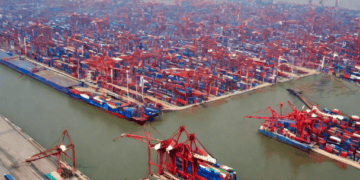China has recently declared the establishment of new free trade zones (FTZs) in Beijing, Hunan, and Anhui, while also expanding the existing Zhejiang FTZ. Each of these zones is designed to leverage the unique strengths and characteristics of their regions, fostering regional industrial clusters and offering policies aimed at attracting investment.
This move by China’s State Council, announced on September 21, marks the creation of three new pilot FTZs and the expansion of the Zhejiang FTZ, introducing test policies encompassing tax reductions, streamlined customs procedures, and industry-specific liberalization.
With this addition, China now boasts a total of 21 free trade zones across the country, each distinguished by its regional industrial focus. This presents significant opportunities for foreign investors, allowing companies to tap into localized networks of suppliers, service providers, and specialized labor pools.
Analyzing the Latest FTZ Plan
The General Plan for the Construction of Three Pilot Free Trade Zones in Beijing, Hunan, and Anhui, alongside the Regional Expansion of the Zhejiang Pilot Free Trade Zone, delineates the framework for these zones.
Common Themes Across FTZ LocationsFour overarching themes are prevalent across all four FTZ locations:
Opening-up of the financial sector Reform in investment Facilitation of trade and innovation Promotion of integrated development within their respective city-clusters or international trade channels However, each zone tailors these themes to suit its unique strengths and characteristics.
Distinct Features of Each Pilot FTZ
Beijing Pilot FTZ:
Spanning 119.68 square kilometers, the Beijing FTZ focuses on science and technology innovation, international business services, and the development of high-end industries. Its core initiatives include:
Implementing new service trade management models Deepening the opening-up and innovation of the financial sector Focusing on the high-quality development of advantageous industries Promoting the integrated development of the Beijing-Tianjin-Hebei region
Hunan Pilot FTZ:
Covering 119.76 square kilometers, the Hunan FTZ emphasizes high-end equipment manufacturing, new-generation IT, biomedicine, e-commerce, and agricultural tech. Its strategic goals include:
Boosting high-quality development of trade and advanced manufacturing Deepening opening and innovation in the financial sector Creating new links to surrounding regions in China Exploring new paths and mechanisms for China-Africa economic trade and cooperation
Anhui Pilot FTZ:
Encompassing 119.86 square kilometers, the Anhui FTZ targets integrated circuits, artificial intelligence, fintech, and cross-border e-commerce. Its primary objectives are:
Promoting high-quality development of trade Deepening innovation and opening-up of the financial sector Fostering innovation-driven development and industry optimization Facilitating integrated development in key economic regions
Zhejiang Pilot FTZ:
Expanded to cover 119.5 square kilometers, the Zhejiang FTZ concentrates on building an international trading center, shipping and logistics hub, and commodity resource allocation base. Its key focuses include:
Constructing a global resource allocation base for bulk commodities Building an international shipping and logistics hub Developing the digital economy Creating an advanced manufacturing cluster
Final Thoughts
China’s strategic expansion of free trade zones signals a targeted approach to foster regional development, attract foreign investment, and test policies that could potentially be scaled up nationwide. These initiatives offer unique opportunities for specialized industries and global investors, positioning China as a hub for innovation and trade in various sectors.
Stay informed with supply chain news on The Supply Chain Report. Free tools for international trade are at ADAMftd.com.
#ChinaFreeTradeZones #BeijingFTZ #HunanFTZ #AnhuiFTZ #ZhejiangFTZExpansion #FreeTradeZoneDevelopment #ForeignInvestment #RegionalIndustrialClusters #TaxReforms #StreamlinedCustoms #InnovationAndTrade #InternationalBusinessServices #Biomedicine #AgriculturalTech #HighEndManufacturing #CrossBorderEcommerce #GlobalShippingHub #DigitalEconomy #AdvancedManufacturing #IntegratedDevelopment #TradeAndInnovation #ScienceAndTechInnovation #FinancialSectorOpening #ForeignInvestorOpportunities #SupplyChainDevelopment

















